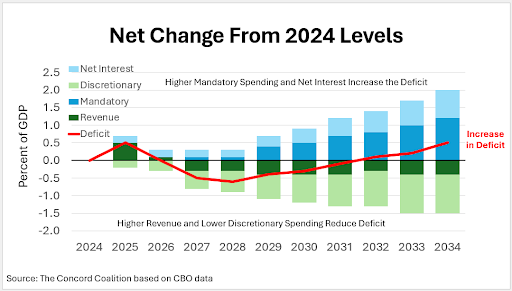The Concord Coalition today noted a small reduction in federal budget deficits projected by the Congressional Budget Office (CBO), but cautioned that the improvements are driven by lower projections of discretionary spending, which is subject to future annual appropriations–and the whims of future lawmakers–not by more permanent factors such as a reduction in mandatory spending or an increase in taxes. Moreover, CBO’s latest projections show an alarming rise in net interest costs, which reach a record high as a share of the economy in 2025 and are projected to exceed defense spending by the end of this year.
“It’s always good to see some improvement in the fiscal outlook but deficits averaging $2 trillion over the next 10 years and a record level of debt-to-GDP by 2028 is not exactly a ‘soft landing’ for the budget. Lawmakers continue to ignore the main drivers of the debt, which consequently remains on an unsustainable path,” said Concord Coalition executive director Robert L. Bixby.
As the chart below illustrates, deficit reduction efforts aimed solely at discretionary spending, while helpful, fall far short of putting the budget on a sustainable path.

The Concord Coalition will publish a more comprehensive analysis of the CBO baseline in this week’s edition of The Lookout.




